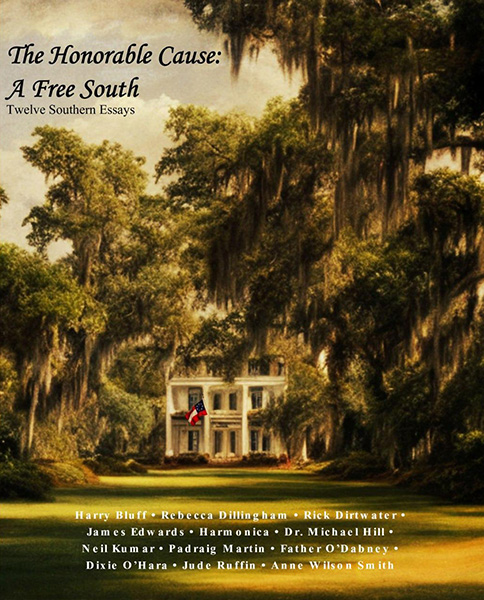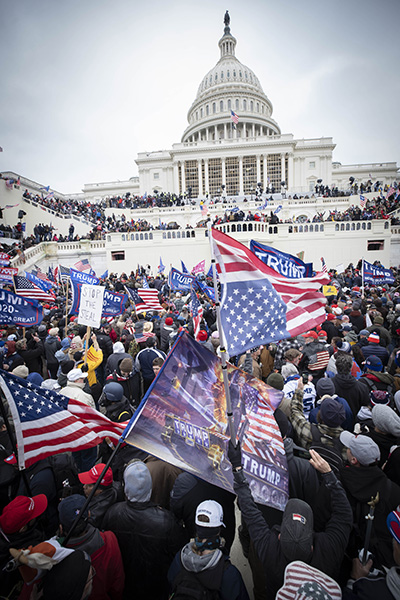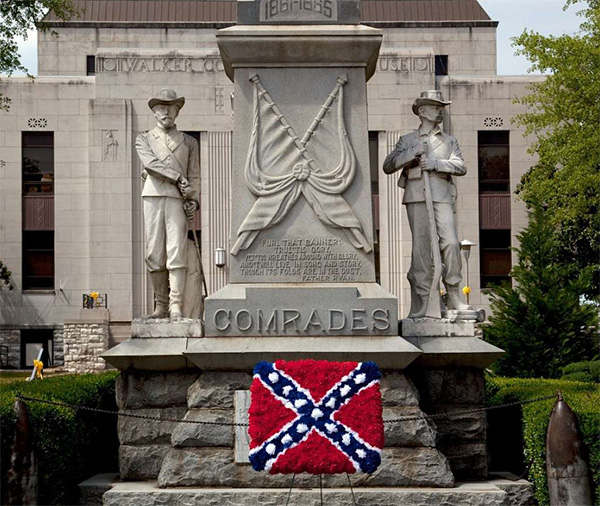A Symposium on Southern Nationalism
F. Roger Devlin, American Renaissance, May 5, 2023

Credit Image: © Richard Ellis/ZUMA Wire
Subscribe to future audio versions of AmRen articles here.
Padraig Martin & Rick Dirtwater (ed.), The Honorable Cause: A Free South, self-published, 2023, 301 pages, $15.99 paperback, $3.49 electronic
This newly published defense of Southern Nationalism has quickly risen to become a bestseller in Amazon’s “nationalism” category. Symptomatic of the times we live in, eight of the 12 contributors have chosen to write under a pseudonym.

Co-editor Padraig Martin explains that the idea for this volume came to him in jail. The one-time conventional conservative attended the Charlottesville Unite the Right rally in August, 2017, wrongly assuming it would be an unproblematic exercise of his constitutional rights of peaceable assembly. But he operates four businesses, and Merrick Garland’s DOJ quickly found a pretext for jailing him for some paperwork violation from years ago. He was given the maximum possible sentence of six months in a federal pen followed by four months’ house arrest, three years’ probation and a $400 fine.
As he explains in the introduction, he used his prison time to put himself through a kind of graduate program in “revolutions, rebellions, and insurgencies,” intensively studying the history of Irish nationalism and radical Islam, as well as various Marxist movements. His reading convinced him that “the United States government is making every classic mistake of a country about to implode.”
The expansion of the police state, the exploitation of media mechanisms to suppress unflattering or contradictory information, the overreaction to dissent, and the targeting of the popular genetic majority through weaponizing minority grievances has always led to a country’s collapse. The only thing we [secessionists] lack . . . is a collapse in democratic trust. As long as Americans trusted that their vote mattered, we had an uphill battle.
But now the “irregularities” of the 2020 presidential election, continued Democratic party opposition to voter ID laws, and the brazen importation of an army of foreign clients across the Southern border are rapidly eroding democratic trust. The overreaction to the election integrity protest of January 6, 2021, is teaching ordinary Trump voters that they are viewed as no different from the “racists” whose suppression they formerly either ignored or applauded. According to Mr. Martin, “there has never been a country that survived the impulsive suppression actions of a reactive government.”

January 6, 2021: Trump supporters successfully stormed the U.S Capitol building. (Credit Image: © Mark Finkenstaedt/ZUMA Wire)
Southern Nationalism is one program for building a better future following a collapse. Mr. Martin defines such nationalism as:
A belief that the Southern people are a unique ethnic group on the North American continent derived from a rich European heritage — namely Anglo and Celtic — with a unique Christian moral foundation. Southerners have their own traditions, history, and culture. They have a right to preserve that rich heritage and ethnic identity. Most Southern Nationalists believe that the only way to preserve that heritage is to secede and rule ourselves.
League of the South president Dr. Michael Hill writes of “organic nationalism” based on kinship and attachment to a real place as something more fundamental and sturdier than a particular form of government such as “liberal democracy.” A nation may choose to govern itself democratically, but democracy cannot provide a substitute for nationhood:
Majority rule only works where there is already a consensus of sorts on the fundamental issues within a society. For instance, in a Christian country that enjoys a high degree of homogeneity in its racial and ethnic make-up, language, institutions, and inherited culture, most matters up for a vote are superficial policy issues. They don’t tamper with the agreed-upon foundations of the society. However, in a multicultural and multiracial, polyglot empire, such as ours is today, the concept of majority rule is often fraught with dire (and even deadly) consequences for the losers, especially if the winners bear a grudge.
The only function of democratic institutions today is to be manipulated by the ruling elite for the benefit of their mostly non-white clients. And despite appearances, our rulers do understand something of the importance of organic nationhood. We can see this in the contradictions of multicultural ideology, which encourages the regime’s client groups “to maintain their own cultures and languages while partaking of the largesse available to them at the expense of taxpaying citizens.”
In any case, a takeover by outsiders will mark the end of “liberal democracy” as well as our nation, since our new masters will have neither the desire nor the capacity to preserve institutions developed by Europeans for Europeans.
Southern Nationalism and white advocacy
The authors of The Honorable Cause all appear to be racially aware, and reject misguided “Rainbow Confederate” efforts to find common ground between the thought of the old South and today’s dominant ideology. The overlap between their aims and beliefs and the work of American Renaissance is thus considerable, but far from perfect. This can be seen in the book’s occasional polemical asides directed against “White Nationalism.”
The authors of The Honorable Cause have some valid points to make. A nation is defined not merely racially but also in terms of territory, language, religion, and shared historical experience. As the confluence of all these sources of attachment, nations command far more intense loyalty than races defined biologically.
Yet, if much is gained, much is lost. One contributor, Neil Kumar, roundly declares: “We do not give one hoot about the fate of New York, California, Illinois, Ohio or any other state not represented by the thirteen stars on each of the national flags of the Confederate States of America . . . . Northern Whites have been, and arguably still are, our most pernicious foes.” By contrast, this publication’s concerns include our racial brethren in the darkest reaches of Vermont and Minnesota — and even abroad. The world has changed greatly since 1865, and many of today’s Northerners are no longer “Yankees” in any meaningful sense; the descendants of post-1865 immigrants to the North such as Italian- and Polish-Americans are among the least vulnerable of our contemporaries to egalitarian utopianism. On the other hand, urban centers in the South have become strongholds of the dominant ideology, and this cannot be entirely blamed on carpetbaggers and coastal transplants.
Mr. Kumar also writes that “many prominent White Nationalists today heap scorn upon the South and our Confederate heritage.” Whoever he may have in mind, it does not include readers of American Renaissance, who — Southerner and Northerner and even European alike — admire the South as a concrete expression of European blood and spirit.
Another contributor writes: “White Nationalist content producers are allowed to thrive because elites know they will never succeed.” But is the regime harsher on Southern Nationalists than on white advocates? We all look the same to it. As noted above, The Honorable Cause is currently selling well on Amazon.com, where several of Jared Taylor’s books are banned.
Southern Nationalism and the non-white population of the South
One of the most serious obstacles to Southern secession, of course, is the presence of large racial minorities: blacks going back to colonial times and mestizos (“Hispanics”) who have arrived more recently. Both groups enjoy obvious benefits from federal patronage and, as Padraig Martin writes, “would oppose secession if they believed it would result in their subjugation.” He looks to the Irish national struggle at the turn of the last century for clues as to how to win them over:
Large blocs of minority Protestants were fearful of an Irish Catholic ascendency and the potential for post-independence retribution. This fear was exploited in Northern Ireland, leading to decades of strife and violence. Meanwhile, in the South — the Republic of Ireland — Irish Nationalists made a concerted effort to invite Protestants to the table. In fact, the flag itself represents an olive branch offered by the Catholic majority to the Protestant minority: green represents the Catholics, orange represents the Protestants, and white represents peace between the two. At no time did the Irish Catholics who led the War of Independence surrender their identity or subordinate their right to freedom to placate Protestant minorities. They simply recognized that they needed to deal with a Protestant minority in a practical way.
Does Mr. Martin believe that blacks and mestizos in the South can be embraced in a similar spirit?
Dr. Hill urges a simpler solution to the mestizo population: “They do not belong here and must be deported, and the borders sealed against them.” But the larger black population has lived in the South virtually for as long as whites have, and even Dr. Hill feels unable to deny them all claim on the region. The best he offers is: “We will have to work out some arrangement based on goodwill from both sides.”
The obstacles to such goodwill are, especially on the black side, great. The current regime benefits from keeping blacks in a state of fear with the preposterous notion that a white South no longer under its boot heel would quickly restore slavery and lynching; hence the ongoing propaganda about “Southern racism” and “neo-confederacy.” But even if Southern Nationalists can shout loudly enough to be heard over all this noise, their actual intentions may not win over many blacks. An independent South would surely abolish racial preferences, limit welfare, and strictly enforce criminal laws (“mass incarceration”). That would work to the long-term benefit of blacks, but the average black voter is not much given to long-term thinking and will see only immediate disadvantages.
One contributor does appear to deny blacks all claim on the territory of the South: Neil Kumar writes that the South “is ours, and ours alone,” and among his criticisms of unnamed “White Nationalists” is that “many” of them “have even suggested giving large swaths of the South to black people.” But if this is not done, the black proportion of an independent South will be about double that of the current United States. Southern Nationalists show little appetite for restoring statutory racial segregation, but what would be the alternative? Integration? How would that be better than what they have under the Washington regime?
The advantages of Southern Nationalism over a racial perspective do not appear to include solutions to such quandaries.
A home for the heart
I have stressed these issues, but my approach risks conveying a misleading impression of The Honorable Cause, for only a small part of the book addresses them. A cause such as Southern Nationalism is more than a political conundrum, and one of the strengths of the Southern Tradition is that it knows itself to be inspired by human attachments difficult to put into words — which is one reason for the continuing importance of symbols such as the battle flag.

Confederate Monument in Jasper, Alabama.
Highlights of the present book include radio host James Edwards’ account of how he conveys a sense of Southern tradition and belonging to his young children by visiting the unspectacular but friendly small towns where his ancestors grew up, and by emphasizing “Dixie O’Hara’s” meditations on the feminine side of Southern life as expressed in cooking, clothing, and devotion to family. One contributor stresses the importance of myth through a fictional account of a Southern Männerbund, or brotherhood. Two contributors focus on the South’s Christian heritage.
As editor Padraig Martin notes in the introduction, “We want to stimulate your mind, but we really want to inspire your heart.” This the 12 authors will surely do, even for readers outside the Southern region and tradition.















